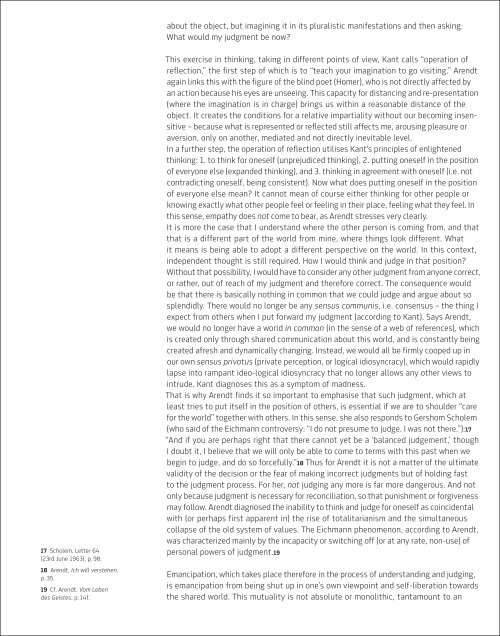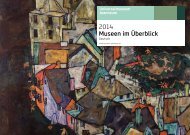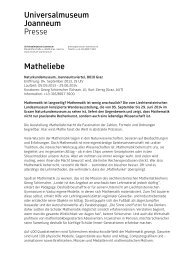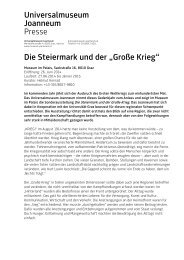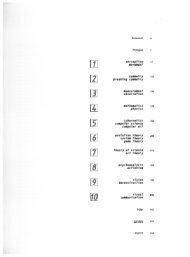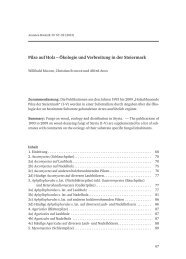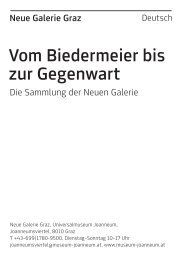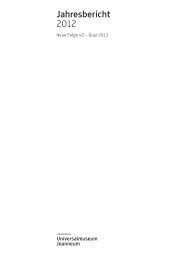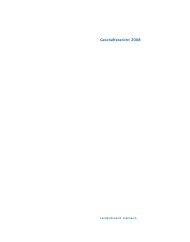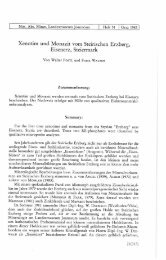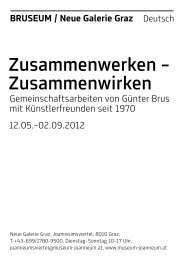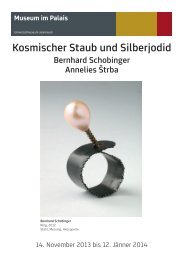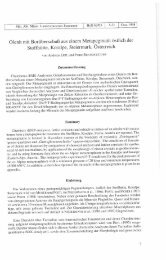Human Condition - Universalmuseum Joanneum
Human Condition - Universalmuseum Joanneum
Human Condition - Universalmuseum Joanneum
Sie wollen auch ein ePaper? Erhöhen Sie die Reichweite Ihrer Titel.
YUMPU macht aus Druck-PDFs automatisch weboptimierte ePaper, die Google liebt.
17 Scholem, Letter 64<br />
(23rd June 1963), p. 98.<br />
18 Arendt, Ich will verstehen,<br />
p. 35.<br />
19 Cf. Arendt, Vom Leben<br />
des Geistes, p. 14f.<br />
about the object, but imagining it in its pluralistic manifestations and then asking:<br />
What would my judgment be now?<br />
This exercise in thinking, taking in different points of view, Kant calls “operation of<br />
reflection,” the first step of which is to “teach your imagination to go visiting.” Arendt<br />
again links this with the figure of the blind poet (Homer), who is not directly affected by<br />
an action because his eyes are unseeing. This capacity for distancing and representation<br />
(where the imagination is in charge) brings us within a reasonable distance of the<br />
object. It creates the conditions for a relative impartiality without our becoming insensitive<br />
– because what is represented or reflected still affects me, arousing plea sure or<br />
aversion, only on another, mediated and not directly inevitable level.<br />
In a further step, the operation of reflection utilises Kant's principles of enlightened<br />
thinking: 1. to think for oneself (unprejudiced thinking), 2. putting oneself in the position<br />
of everyone else (expanded thinking), and 3. thinking in agreement with oneself (i.e. not<br />
contradicting oneself, being consistent). Now what does putting oneself in the position<br />
of everyone else mean? It cannot mean of course either thinking for other people or<br />
knowing exactly what other people feel or feeling in their place, feeling what they feel. In<br />
this sense, empathy does not come to bear, as Arendt stresses very clearly.<br />
It is more the case that I understand where the other person is coming from, and that<br />
that is a different part of the world from mine, where things look different. What<br />
it means is being able to adopt a different perspective on the world. In this context,<br />
independent thought is still required. How I would think and judge in that position?<br />
Without that possibility, I would have to consider any other judgment from anyone correct,<br />
or rather, out of reach of my judgment and therefore correct. The consequence would<br />
be that there is basically nothing in common that we could judge and argue about so<br />
splendidly. There would no longer be any sensus communis, i.e. consensus – the thing I<br />
expect from others when I put forward my judgment (according to Kant). Says Arendt,<br />
we would no longer have a world in common (in the sense of a web of references), which<br />
is created only through shared communication about this world, and is constantly being<br />
created afresh and dynamically changing. Instead, we would all be firmly cooped up in<br />
our own sensus privatus (private perception, or logical idiosyncracy), which would rapidly<br />
lapse into rampant ideological idiosyncracy that no longer allows any other views to<br />
intrude. Kant diagnoses this as a symptom of madness.<br />
That is why Arendt finds it so important to emphasise that such judgment, which at<br />
least tries to put itself in the position of others, is essential if we are to shoulder “care<br />
for the world” together with others. In this sense, she also responds to Gershom Scholem<br />
(who said of the Eichmann controversy: “I do not presume to judge. I was not there.”):17<br />
“And if you are perhaps right that there cannot yet be a ‘balanced judgement,’ though<br />
I doubt it, I believe that we will only be able to come to terms with this past when we<br />
begin to judge, and do so forcefully.”18 Thus for Arendt it is not a matter of the ultimate<br />
validity of the decision or the fear of making incorrect judgments but of holding fast<br />
to the judgment process. For her, not judging any more is far more dangerous. And not<br />
only because judgment is necessary for reconciliation, so that punishment or forgiveness<br />
may follow. Arendt diagnosed the inability to think and judge for oneself as coincidental<br />
with (or perhaps first apparent in) the rise of totalitarianism and the simul taneous<br />
collapse of the old system of values. The Eichmann phenomenon, according to Arendt,<br />
was characterized mainly by the incapacity or switching off (or at any rate, nonuse) of<br />
personal powers of judgment.19<br />
Emancipation, which takes place therefore in the process of understanding and judging,<br />
is emancipation from being shut up in one’s own viewpoint and selfliberation towards<br />
the shared world. This mutuality is not absolute or monolithic, tantamount to an


